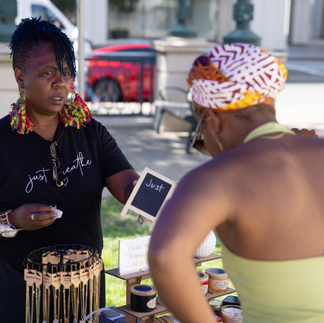Black August: Where Resistance, Liberation, and Joy Coexist
- bossbayarea

- Jun 11, 2025
- 3 min read
By Chef Satia for BOSS
Black August didn’t start on a stage or a flyer. It was born in a cell.
In the 1970s, inside the walls of San Quentin, a group of incarcerated revolutionaries committed themselves to something greater than survival. They chose discipline, study, resistance, and honoring those who had been killed in the struggle for our freedom. Black August wasn’t an idea, a method, a way to build, remember, and move.
I've been patient, but where I'm concerned patience has its limits. Take it too far, and it's cowardice. George Jackson, Soledad Brother: The Prison Letters of George Jackson

We say the names because we must: George Jackson.
Jonathan Jackson.
W.L. Nolen.
Their lives—and their assassinations—are not chapters in a history book. They are instructions. And they are the reason Black August exists.
We continue this work not because it’s popular but because it’s necessary.
Dr. Greg Thomas reminds us that Black August is “a month of education, reflection, and recommitment.”
That recommitment is still happening today—in prison yards, classrooms, community kitchens, and spaces like ours at BOSS. This month is sacred, and it asks something of all of us.
Black August moves through five pillars:
Study – We must know our own stories to stop letting others rewrite them.
Sacrifice – Freedom is not free, and some gave everything.
Resistance – Systems of oppression are still alive, and so are we.
Meditation – Clarity is part of the strategy.
Discipline – This work demands consistency, not just passion.
Black August is not just about memory. It’s about method. Minister King X of the Black August 21 Collective
This is Still Happening
We don’t speak of Black August in the past tense. Mass incarceration is still tearing through our communities. As of 2023:
Over 2 million people are incarcerated in the U.S.
More than 65% of people in California prisons are Black or Latinx.
Almost half of all Black trans women in this country have experienced incarceration.
These are not just numbers. They are names, families, and futures. And if that doesn’t call us to move, what will?
And Yet, We Still Dance
There’s something sacred in our ability to smile. To cook. To laugh. To walk in the sun. That’s not ignoring the struggle—that’s surviving it.
We must love each other and support each other. Assata Shakur
We created the Black August Block Party not to water this down but to widen it. We want to make space for returning citizens to be honored, for artists, speakers, and families to gather, for our people to feel what liberation sounds like on a mic, on a stage, in a circle, to meet the moment with presence and power.
We anchor our observance in four core pillars: art, culture, political education, and economic empowerment.
Art tells our stories when words fall short. It carries memory, sparks healing, and ignites action. From the walls of a city to the chords of a protest anthem, Black artistic expression has always opened the door to truth.
Culture grounds us. It connects us to our people, our rituals, and our joy. Culture is the quiet understanding passed down in recipes, rhythm, and how we show up for one another. It doesn’t need to be explained; it’s understood. In a world built to strip identity, culture keeps us.
Political education shapes our power. It helps us understand the systems we’re navigating and how to shift them. It’s how awareness becomes strategy and how we prepare each other to lead.
Economic empowerment is about creating something sustainable. It’s training, ownership, entrepreneurship—real tools that create options, not just hope. Liberation work without an economic base can’t hold. So we build one.
Black August reminds us that we are the infrastructure. And it’s up to us to keep building.
This month, and every month after, Black August 365, keep honoring our martyrs, our people, and each other.
Sources:
The Sentencing Project (2023).
National Center for Transgender Equality (2022).
California Department of Corrections and Rehabilitation (2023).
Interview with Minister King X, Black August 21 Collective.
Assata: An Autobiography by Assata Shakur.
The BOSS Black August community celebration, block party, and fundraiser launched August 2021 to support BOSS’ Reentry & Neighborhood Safety programs – health, housing, employment and other resources for Black, Indigenous, and
People of Color (BIPOC) communities in areas that are disproportionately affected by racially biased policies and systemic inequities - East, West, and Downtown Oakland.
The Black August commemoration and celebration showcases the art, entrepreneurship, activism, voice, and achievements of our community!
Please don't miss the 2025 BOSS Black August Celebration!









































Comments